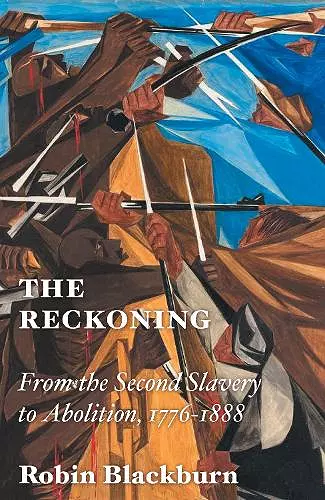The Reckoning
From the Second Slavery to Abolition, 1776-1888
Format:Hardback
Publisher:Verso Books
Published:6th Feb '24
Should be back in stock very soon

How was slavery defeated in the Americas? The Reckoning is Robin Blackburn's compelling and authoritative account
The Age of Revolution (1776-1848) destroyed the main slave regimes of the Caribbean but a 'Second Slavery' surged in the US South, Cuba and Brazil, powered by demand for plantation produce and a system of financial credit that leveraged the value of the slaves. By 1860, more than 6 million captives of African descent toiled to produce the cotton, sugar and coffee craved by global consumers. This 'Second Slavery' mimicked capitalist disciplines, intensified slavery's racial character and launched half a century of headlong economic growth.
On the eve of the American Civil War, the Slave Power seemed invincible. The slaveholding elite entrenched their 'peculiar institution' in the fabric of the Union only to risk everything on secession. Nobody solicited the slaves' wishes until it became clear that, wherever they could, they were deserting the plantations and joining the Union forces.
Abolition radicals destroyed the Second Slavery and victory for the North also spelled defeat for slavery in Cuba and Brazil. But in each of these societies racial oppression was to be reconfigured by 'Black Codes', Jim Crow and toxic doctrines of racial destiny.
Slavery leaves an indelible mark on many Atlantic nations. The Reckoning charts the historic impact of slavery and anti-slavery, of black and white activists, of fugitive slaves, feminists, writers, clerics and soldiers. Notwithstanding much unfinished business, the anti-slavery struggle retains its capacity to illuminate and inspire.
Tremendously impressive, the result of a lifetime of learning. Historical writing at its best -- Marcus Rediker, author of The Slave Ship
By concluding his decades-long project on New World slavery, and by drawing the attention of British readers to an often-neglected aspect of that history, Blackburn has fittingly capped a lifetime of scholarship. -- Michael Taylor * Literary Review *
A comprehensive history of the final years of slavery in the Americas ... The Reckoning provides important insight into why the United States political and commercial reality is where it's at today. -- Ron Jacobs * Counterpunch *
A magnificent conclusion to a quartet of books on New World slavery ... in explaining the economics of the Second Slavery [Blackburn] never lets us forget the brutality under-pinning it. It kept me riveted throughout. -- Chris Bambery * Counterfire *
Robin Blackburn, longtime editor of the New Left Review, is probably the foremost Marxist historian of New World slavery working today ... With The Reckoning: From the Second Slavery to Abolition, 1776-1888, the historian provides the long-awaited concluding volume to his chronological trilogy on racial slavery in the New World. -- Owen Dowling * Jacobin *
Slavery in America, Brazil, and Cuba relied on capitalist markets, which supplied credit and demand for slave-made goods. The Reckoning, Robin Blackburn's monumental history, offers a dizzying account of the politics behind this system's rise and fall. -- Alec Israeli * Jacobin *
While historians have given us accounts of the second slavery before, Blackburn is one of the first to provide us with a comprehensive narrative of what one may call the 'second abolition.' -- Manisha Sinha * The Nation *
Towards the end of the 18th century, slavery seemed to be fading as an institution, yet the 19th century saw intense expansions of slavery and new levels of exploitation in Cuba, Brazil, and the Southern United States. Robin Blackburn is the author of several works on the history of Atlantic slavery, and The Reckoning is clear, concise, and comprehensive-an essential addition to the history shelves and a necessary antidote to historical amnesia. * Lit Hub *
ISBN: 9781804293416
Dimensions: 234mm x 153mm x 39mm
Weight: 722g
544 pages